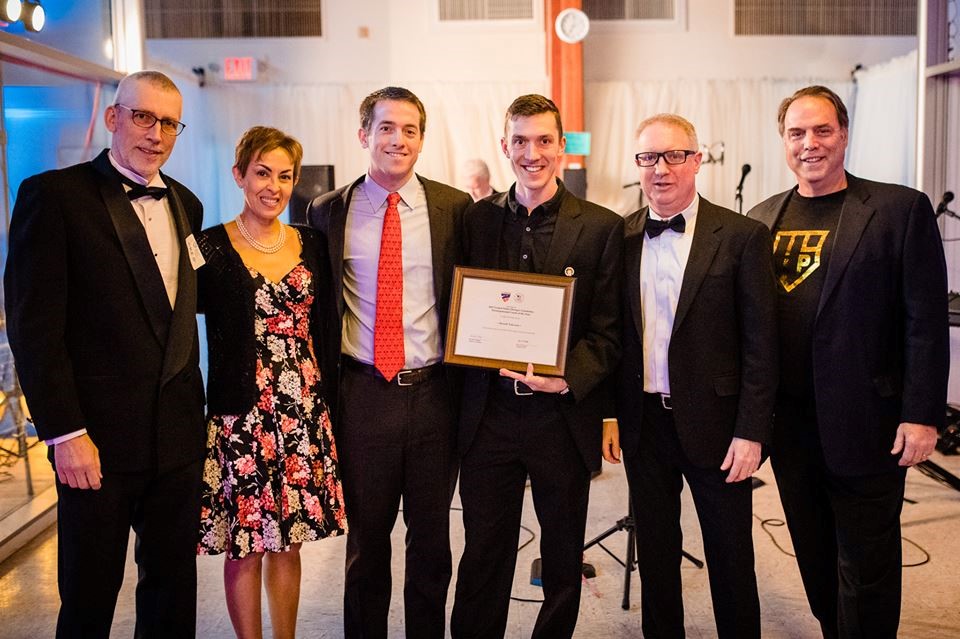
Barrett Takesian was honored with the 2017 United States Olympic Committee Developmental Coach of the Year Award during Portland Community Squash’s “Squash Ball” on April 7 in Portland, Maine.
Five years ago Takesian founded Portland Community Squash in pursuit of opening a public facility in Maine’s most populous city. In February 2017, Portland Community Squash realized its dream by opening a four-court, 13,000-square-foot facility that employed a public membership model. Portland Community Squash offers three programmatic areas: adult memberships with box leagues, ladders and drop-in court hours; after-school junior memberships that offer academic and wellness support in addition to squash; and Rally Portland—an urban leadership program following the Squash + Education Alliance model—that launched this past fall.
The building is a re-purposed synagogue with the courts constructed in the former sanctuary and community gathering room; classrooms are attached in a separate wing. The four softball courts became the first international regulation courts in Portland.
Harry Smith, US Squash Director of Junior Development, presented the award to Takesian before hundreds of Portland Community Squash players and supporters at the Squash Ball, the program’s annual fundraiser.
“I dedicate this recognition to all of the people who have pushed the sport forward,” said Takesian, PCS President & Executive Director. “Everyone who standardized the game across the world, who grew junior squash participation, who enhanced technology for organized and competitive play, who contributed to the Squash and Education Alliance, who expanded college squash, and who promoted the professional game. You have all turned squash into an amazing tool for building community and impacting the lives of youth. I feel extremely lucky to be involved with squash now and into the future.”
It took nearly a decade for the Portland squash community to create the demand for a public facility. In 2008 local player Greg Born first started organized play on Portland YMCA’s two old hardball courts. Born set up a Maine Squash website and since May 2010 has administered a box league every month with US Squash software. As interest and participation grew, the Y made its first racquetball court conversion in 2010 and a second in 2012.
In 2012, Takesian, a recent Bowdoin graduate, moved to Portland and joined Born and the Y community. Barrett had worked at SquashBusters in Boston and discussed with urban squash founder Greg Zaff the idea of starting an urban program in Portland. In 2013 in partnership with the Y’s after-school programs, Takesian launched Portland Squash with a focus on youth programs. Portland Squash, soon re-branded as Portland Community Squash, had a primary goal of pursuing a facility that would house adult members, junior programs and an urban after-school program.
In 2014 and 2015, PCS developed on both the adult and junior fronts. Partnering with US Squash, Born introduced Club Locker‘s newly-launched court reservation system in addition to boxes and leagues, which continued to spike adult participation. By 2015, nearly 200 adults and over a hundred youth players were using the online system, to the point that the two converted courts reached what Takesian described as a “saturation point,” Demand had overwhelmed availability.
This model of racquetball court conversions—US Squash supports such efforts with racquetball court conversion grants—in conjunction with Club Locker technology can fill any community’s squash void, according to Takesian.
“The Club Locker technology from US Squash makes one person as effective as a full staff of squash pros,” Takesian said. “Previously, club pros were setting up matches manually, but everything is so automated now. Greg runs leagues for more than two hundred people and does it as a volunteer on the side. It’s been an amazing tool to help us grow. Almost every city in the country has at least one racquetball court where Portland’s story can be replicated.”
In 2015 PCS began to pursue seven different development opportunities hoping to lease a building. As those opportunities fell through for various reasons, the search yielded Congregation Shaarey Tphiloh. Maine’s oldest continuously-operating synagogue, Shaarey Tphiloh had a 1950s-era building on Noyes Street in Portland’s Woodford’s Corner neighborhood. It was on the market for $1.2 million. PCS raised $1.5 million, including a $10,000 contribution from US Squash, and the building was purchased in September 2016.











